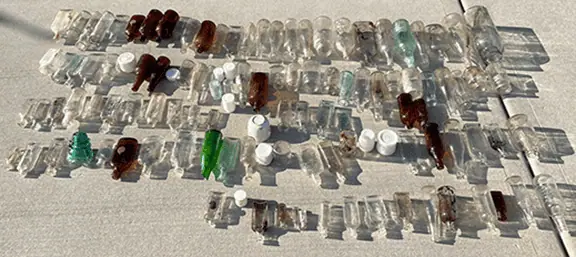

SCS’s Green Street Blog Series: Part IV
In our Green Street blog series, SCS helps identify and avoid potential environmental issues and sometimes surprises on redevelopment or voluntary remediation sites. In Part IV, we uncovered another buried surprise, a hidden treasure for the community, historical artifacts.
During the Green Street property clean-up, SCS discovered antique bottles, sparking even more excitement in the community. Unearthing these hidden treasures shed light on the area’s history and ignited a sense of curiosity and wonder among residents and historians alike.

The antique bottles, discovered while managing the impacted soils, were collected and cleaned with the help of two local Boy Scouts, and we hope future SCS professionals. SCS Senior Project Manager Mike Dustman says, “With the help of my two boys, who received scouting service hour credit for their efforts, we cleaned over 300 antique bottles. The boys diligently worked alongside me, carefully cleaning each bottle to reveal its unique history and beauty.”
The sheer quantity of bottles and the boys’ dedication impressed the Lee’s Summit team, who asked for a photo of the boys cleaning bottles and in their scouting uniforms to showcase their amazing discovery.
Interestingly, these historical artifacts are not native to the site, suggesting they arrived possibly in fill from a previous period, adding another layer of mystery to the discovery. Uncovering these antiques provides a fascinating glimpse into the past and brings the community together in shared discovery and appreciation for local history.

The artifacts, spanning various periods, served multiple purposes. Among the finds were ketchup, beer, wine, soda, and whiskey bottles; apothecary and cosmetic bottles; ink wells; and insecticide jugs. Each one tells a story, reflecting the daily lives and practices of those who used them. These containers offer a glimpse into the past, revealing everyday items’ diverse uses, from the mundane to the medicinal.
Phase I of Green Street in Lee’s Summit, Missouri, is scheduled for completion in June, adding a vibrant addition to the community, including a farmers market, event space, outdoor performance area, a beautifully landscaped pavilion, and now a peek into our local history.
Additional Resources:

SCS Engineers has been awarded Phase 1 and Phase 2 on-call brownfield services for the City of Tucson. Voluntary Remediation Programs encourage property owners and other interested parties to invest resources voluntarily to restore contaminated sites as quickly as possible to healthful standards. Often these sites are in now historically significant neighborhoods with excellent infrastructure.
Remediation of Historic Properties
In 2022, the Environmental Protection Agency selected Tucson for a $1 million grant to focus on the neighborhoods of La Doce, Thrive in the O5, Barrio Centro/Julia Keen Neighborhood, and Downtown Tucson/Historic Barrios. The areas were chosen because of their economic and cultural significance to the community and redevelopment potential. Priority sites include a vacant former fueling station, a vacant former private school, a transit center, and an adjacent parking lot.
SCS offers full services such as assessment, cleanup planning, remediation, and regulatory closure of properties participating in grant-funded activities and properties owned or redeveloped by the City.
“Our team has deep experience in brownfield environmental services and understands the complexities involved to remediate property successfully,” said Iain Olness, senior project manager at SCS Engineers’ Tempe office. “We are honored to work with local governments across Arizona to return sites into economic drivers for their communities.”
SCS Engineers welcomes Melissa Schick to the environmental firm’s Brownfields and Voluntary Remediation practice, which works nationwide, supporting municipal and public/private sector ventures to remediate previously thought unusable properties back to life.
These properties are not exclusively but often found in urban areas with existing supporting infrastructure. New technologies and environmental processes can turn these well-situated properties safe again for almost any redevelopment purpose, whether housing, recreational facilities, retail/office, or logistics centers.
Schick brings her knowledge of state and federal brownfield redevelopment and voluntary remediation cleanup program regulations. She specializes in U.S. Environmental Protection Agency (USEPA) Regions 3, 4, and 6, supporting the grant application process or overseeing the implementation of USEPA assessment and cleanup grants which provide funds for municipalities to redevelop sites.
Since brownfields and voluntary remediation create valuable economic and natural resources for communities, clients find her experience coordinating communications, outreach, and educational events helpful. As this work demands, Schick often focuses on improving the communications between private developers, regulatory agencies, community leaders, and other partners to smooth project implementation, keeping projects on track and within budget.
“Importantly, Melissa is an ethical and caring person whose work in communities matters to her,” states Kirk Blevins, SCS Project Director. “As a local environmental engineering and consulting firm, she enhances our national practice as a detail-oriented resource to augment communications, outreach, and reporting for comprehensive and cohesive project success.”
Schick has professional affiliations with the Florida Brownfield Association – Board of Directors, the Society of American Military Engineers, and the Florida Association of Environmental Professionals.
We welcome you to learn more about Melissa Schick’s work, background, and education in land remediation services on the SCS website.
Additional Resources:
SCS’s next webinar helps our clients prepare to capitalize on upcoming opportunities to redevelop contaminated properties as a result of market demands, stimulus funding, and traditional Brownfields grant programs. In this live, non-commercial presentation we’ll cover the following:
This educational, non-commercial webinar with a Q&A forum is free and open to all who want to learn more about meeting the environmental challenges these new opportunities offer. We recommend this month’s discussion for developers, contractors, municipal officials, city managers interested in using stimulus funds for local development, and advisors such as banks, insurance firms, and attorneys to private and public entities.
DATE: Thursday, April 29, 2021
TIME: 2 p.m. ET, 1 CT, Noon MT, 11 PT
You will receive a Zoom email with your link to attend. Do not share this link.